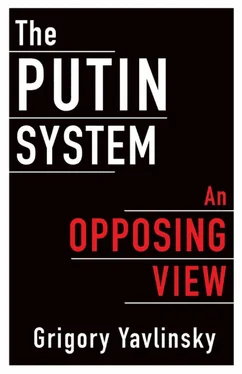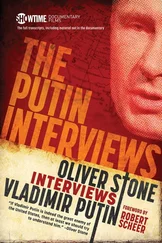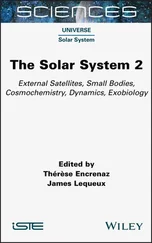Putnam, Robert, xiii
Realeconomik (Yavlinsky), 143
reform of Russian system: alliance of Western and Russian progressives in, xv, xviii–xix; attitudes of elites needed for transition to competition-based system, 177–78; brief flirtations with, in 2000s, 59, 63; dependence on influences from West, xiv–xv; desired outcomes of, 17–18; elite support necessary for, 6–7, 177–78, 181; impossibility of, in current system, 65, 75; room for opposing forces to change course of, 195–97, 200–201, 204; serious disruption required to dislodge elite, 37. See also transition to modern economy
regional governments, central government control over, 68, 78, 168, 207n9
rent extraction in authoritarian systems, 81–83
rent extraction by Russian bureaucracy, 80–85; increased costs and declining efficiency resulting from, 83–85; lack of checks and balances and, 81–82; preservation of, as goal of government, 65; slowing of, and need for ideology, 90, 161; as source of power, 5, 65, 121, 131, 134, 194; and staffing of agencies, 87
rents, types of, 143
resources, Kremlin-controlled, distribution to other branches of government, as necessary reform, 18
Robinson, James, 26
rule of law in Russia: decline of, 14, 31–32, 40, 53, 56; failure to establish, 189; instability of, 130; judiciary’s ineffectiveness and, 128–29; reforms needed to establish, 6. See also corruption in Russia
Russian meddling in Western countries: degree of, ix–x, xii–xiii; efforts to discredit Western values, xii–xiii, xiv; interference in elections, x, xii; potential for increase in, xiv; realignment to Russia’s advantage as goal of, xiii; weakening of Western institutions and, xiii–xiv; Yabloko’s opposition to, xvi, xviii
Russian revolution of 1917–1918: outdated institutions as factor in, 45; Tsarist resistance to change and, 157
“Russian world” concept, 165, 180
Saltykov-Shchedrin, Mikhail, 38
separation of powers: as characteristic of democratic systems, 53; Russian drift toward totalitarian state and, 197–98
Serdyukov, Anatoly, 208n9
Shchekochikhin, Yuri, 200–201
Skripal, Sergei, 203
smart power resources, Russia’s lack of, 181
social base of Russian rulers, transition into form characteristic of low-development countries, 116–23
social systems, interaction with economic systems, 11–13
societal goals, as separate issue from type of system, 24–26
soft power resources, Russia’s lack of, 181
Soviet Union: age of stagnation in, 185; decline in educational and cultural standards in, 46; and delegitimization of property ownership, 47–48; destruction of propertied class, repercussions of, 46–47; as deviation from Russia’s natural European development path, 155; ideological influence on Russian government of 1990s, 51–52; inevitability of collapse, 189
static political systems: characteristics of, 27–28; examples of, in both authoritarian and competition-based systems, 28–29
Syria, Russian interference in: and tensions between Russia and West, 148, 149; Yabloko’s opposition to, xvi–xvii, xviii
terminology for political systems, 19; change in meaning over time, 20; democratic, as term, 20–21; reductive nature of labels, 13, 19, 24; subjective bias in, 13, 20, 24
territorial conquest: as obsolete form of exploitation, 142–43; Russian foreign policy focus on unification of ethnic Russians, 165, 180, 198
totalitarian Russian state, push toward, 84, 146, 162–63; and denigration of critics as tools of foreign interests, 164; and diminishing economic opportunities, 183; and distancing from Western values, 163, 165, 197–98; and economic competition and innovation, narrowing of opportunity for, 171–73; economic consequences of, 185; election of 2018 and, 201; and elimination of political competition, 167, 168–71, 199–201; features vs. totalitarianism of past century, 188–89; and foreign policy focus on territorial expansion to unify ethnic Russians, 165, 180, 198; hardening of totalitarian features, 163; and increased concentration of power in Putin, 202; and increased focus on ideology, 197–99; increasing autocratic power of Putin, 173; and institutions, increasing irrelevance of, 166–67; and lack of government accountability, 164; media and, 164; and obligatory compliance with ideology, 162–63, 164; and political postmodernism, 188–89, 201; purging of “troublemakers” from institutions, 164–65; room for opposing forces to affect, 195–97, 200–201, 204; and vertical power hierarchy, xvii, 167. See also ideology of Russian government in 2010s
totalitarian systems, use of ideology for social control, 85–86
transition to modern economy: authorities’ blocking of, 9, 157, 185–86; authorities’ political will and, 9–10; disappearance of once-available options, 14; failed, causes of, 4–5; lack of entrepreneurial class to implement, 8–9; potential for, as unclear, 13–14; reforms needed to effect, 4–5, 5–6
translations of political works, value for universal language of mutual understanding, xix
Ukraine, European development path as only available option for, 155, 160
Ukraine, Russian interference in: goal of, 158; and Maidan revolution, 156; potential political repercussions of, 155; as product of Russian authoritarian government, 154–55, 157–58; Putin’s elimination of political opposition and, 169; Russia’s deviation from natural European development path and, 155–59; and tensions between Russia and West, 148, 149, 151; Yabloko’s opposition to, xvi, xviii
uniformed agencies: role of, in countries of near vs. distant periphery, 115–16; in Russia, and social support of government, 118
United Democratic Party Yabloko. See Yabloko
United Russia Party, xvii, 68, 202
United States: election of 2016, Russian interference in, x, xii; as villain, in Russian ideology, 93–96. See also entries under West
universal language of mutual understanding, decay of, xix
Urlashov, Yevgeny, 79–80
vertical hierarchy of power: as characteristic of Eurasianism, 122–23; and control of elections and political processes, 68–69, 76, 77, 104; and control of financial flows, 104; corporatism and, 122–23; establishment of, 168–71; and push toward totalitarianism, xvii, 167
Wallerstein, Immanuel, 211n10
wealthy class: as necessity for support of political parties, 46–47, 57–58; oligarchs lack of status as, 57–59
West, Russian confrontation with: belt of instability created by, 159; and blaming of Western sanctions for deteriorating economy, 151; economic factors driving, 151–52; hard-line Western responses, as counterproductive, xii; history of tensions, 147; and increased Russian isolationism, 146, 149–50, 153–54, 172, 173; intensification of, 145–46, 148; vs. Kremlin’s rhetoric on cooperation, 150; as new, long-term status quo, 150, 154; and new ideology, effort to develop, 146; obstacles to reversal of, 154; possibility of different relationship, xi; and potential Russian expansionism, 158–59, 180, 198; as product of Russia’s authoritarianism, xi; and propaganda value of Western accusations, 203; Putin’s cold reception by Western leaders and, 152; and refusal to abide by Western rules, 146, 147–48, 153, 180; restrictions on opposition to, 146; and Russian defiance of Western objections, 148–49; Russian drift toward totalitarian state and, 163; Russian elite’s support for, 150, 152, 153–54; and toxic environment for Russia’s neighbors, 159; Ukrainian crisis and, 155–59; as unlikely to change Western values, 180; and upswing in public’s patriotic feeling, 153; West’s characterization as disruptive and hostile, 148, 149; and West’s sanctions, 149, 153–54; Yabloko’s commitment to easing, xvi. See also isolationism of Russia
Читать дальше












